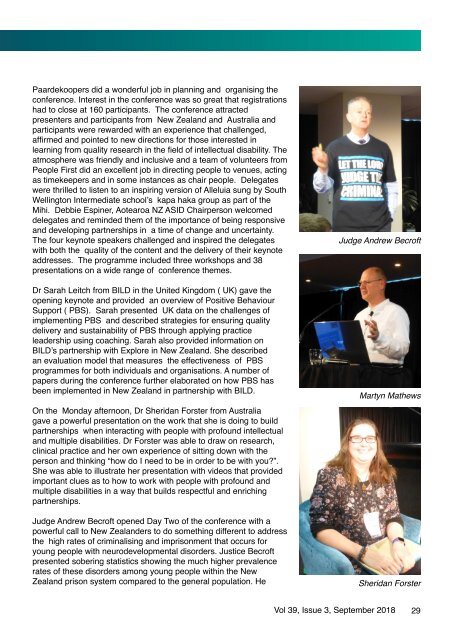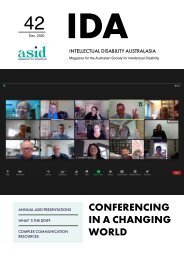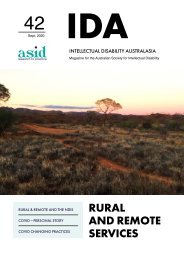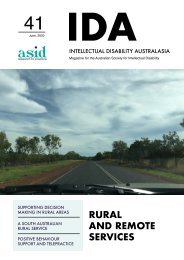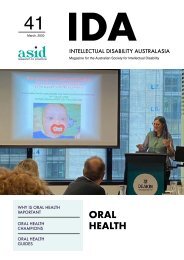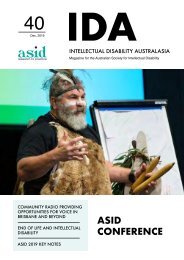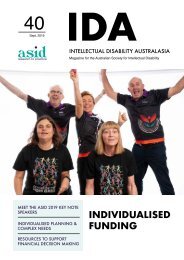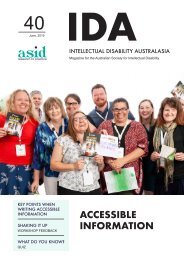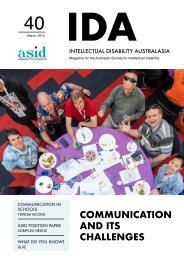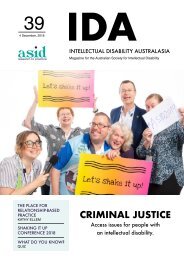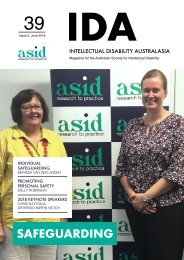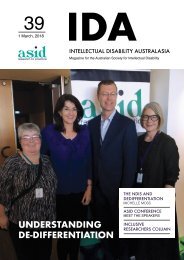IDA Magazine Vol 39 Iss 3 (Sept 2018)
Create successful ePaper yourself
Turn your PDF publications into a flip-book with our unique Google optimized e-Paper software.
Paardekoopers did a wonderful job in planning and organising the<br />
conference. Interest in the conference was so great that registrations<br />
had to close at 160 participants. The conference attracted<br />
presenters and participants from New Zealand and Australia and<br />
participants were rewarded with an experience that challenged,<br />
affirmed and pointed to new directions for those interested in<br />
learning from quality research in the field of intellectual disability. The<br />
atmosphere was friendly and inclusive and a team of volunteers from<br />
People First did an excellent job in directing people to venues, acting<br />
as timekeepers and in some instances as chair people. Delegates<br />
were thrilled to listen to an inspiring version of Alleluia sung by South<br />
Wellington Intermediate school’s kapa haka group as part of the<br />
Mihi. Debbie Espiner, Aotearoa NZ ASID Chairperson welcomed<br />
delegates and reminded them of the importance of being responsive<br />
and developing partnerships in a time of change and uncertainty.<br />
The four keynote speakers challenged and inspired the delegates<br />
with both the quality of the content and the delivery of their keynote<br />
addresses. The programme included three workshops and 38<br />
presentations on a wide range of conference themes.<br />
Dr Sarah Leitch from BILD in the United Kingdom ( UK) gave the<br />
opening keynote and provided an overview of Positive Behaviour<br />
Support ( PBS). Sarah presented UK data on the challenges of<br />
implementing PBS and described strategies for ensuring quality<br />
delivery and sustainability of PBS through applying practice<br />
leadership using coaching. Sarah also provided information on<br />
BILD’s partnership with Explore in New Zealand. She described<br />
an evaluation model that measures the effectiveness of PBS<br />
programmes for both individuals and organisations. A number of<br />
papers during the conference further elaborated on how PBS has<br />
been implemented in New Zealand in partnership with BILD.<br />
On the Monday afternoon, Dr Sheridan Forster from Australia<br />
gave a powerful presentation on the work that she is doing to build<br />
partnerships when interacting with people with profound intellectual<br />
and multiple disabilities. Dr Forster was able to draw on research,<br />
clinical practice and her own experience of sitting down with the<br />
person and thinking “how do I need to be in order to be with you?”.<br />
She was able to illustrate her presentation with videos that provided<br />
important clues as to how to work with people with profound and<br />
multiple disabilities in a way that builds respectful and enriching<br />
partnerships.<br />
Judge Andrew Becroft opened Day Two of the conference with a<br />
powerful call to New Zealanders to do something different to address<br />
the high rates of criminalising and imprisonment that occurs for<br />
young people with neurodevelopmental disorders. Justice Becroft<br />
presented sobering statistics showing the much higher prevalence<br />
rates of these disorders among young people within the New<br />
Zealand prison system compared to the general population. He<br />
Judge Andrew Becroft<br />
Martyn Mathews<br />
Sheridan Forster<br />
<strong>Vol</strong> <strong>39</strong>, <strong>Iss</strong>ue 3, <strong>Sept</strong>ember <strong>2018</strong><br />
29


